
December 25
1899 Birth: Humphrey Bogart:
Humphrey Bogart was born on December 25, 1899, in New York City. He began his career on Broadway in the 1920s. This led to B-movie parts in 1930s Hollywood. Bogart's turning point came in the 1940s, with his legendary roles in The Maltese Falcon and Casablanca. He married several times throughout his life, with his last wife being actress Lauren Bacall. He died in 1957 at the age of 57 to esophageal cancer. . . . [The Maltese Falcon] allowed Bogart to prove his versatility as an actor just in time to be cast in the leading role in the 1942 war romance Casablanca. Bogart played Rick Blaine, an American expatriate struggling to rekindle his relationship with his Norwegian lover (Ingrid Bergman) in the midst of World War II. Casablanca won three Academy Awards (Best Picture, Best Screenplay, Best Director) and is now ranked among the greatest films of all time. Also one of the most quotable films of all time, Casablanca ends with the unforgettable words, spoken by Bogart, "I think this is the beginning of a beautiful friendship." [For further information, click here.]
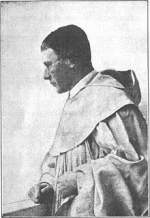
1900 Volkishness: Adolf Josef Lanz (Liebenfels) later claims that it was on this date that he founded the Order of the New Templars. Lanz said he set himself up as the order's Grand Master and adopted the swastika as his emblem. Note: Historians believe the order was not modeled along Templar lines until sometime after 1905. (THP)
1907 Volkishness: Jorg Lanz Liebenfels celebrates Christmas Day by hoisting a swastika flag from the high tower of Burg Werfenstein. Two flags are flown: one displaying the Liebenfels blazon, while the other shows a red swastika surrounded by four blue fleur-de-lis upon a golden field. (THP)
1914 World War I: Various:
Christmas truce:
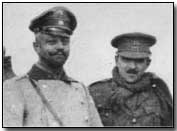
Just after midnight on Christmas morning, the majority of German troops engaged in World War I cease firing their guns and artillery and commence to sing Christmas carols. At certain points along the eastern and western fronts, the soldiers of Russia, France, and Britain even heard brass bands joining the Germans in their joyous singing.
At the first light of dawn, many of the German soldiers emerged from their trenches and approached the Allied lines across no-man's-land, calling out "Merry Christmas" in their enemies' native tongues. At first, the Allied soldiers feared it was a trick, but seeing the Germans unarmed, they climbed out of their trenches and shook hands with the enemy soldiers. The men exchanged presents of cigarettes and plum puddings and sang carols and songs. There was even a documented case of soldiers from opposing sides playing a good-natured game of soccer. (History.com)
[Note: The scenario was never repeated, because of strict orders. It would not have been appropriate for the troops to think of the enemy as human beings.]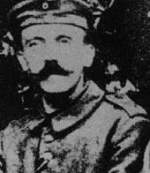
Dec 25-Mar 9, 1915: Gefreiter Adolf Hitler serves at Neuve Chapelle as a Dispatch Runner with Regimental HQ, 16 Bavarian Infantry Regiment. He strongly disapproves of the Christmas Truce. (Maser)
The French battleship Jean Bart is torpedoed by an Austrian submarine in the Straits of Otranto. [For further details, Click here.]
1917 World War I Despatch Number 4 by Sir Douglas Haig, British Commander-in-Chief:
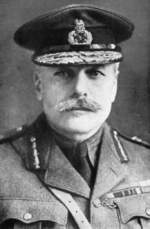
The general conditions of the struggle this year have been very different from those contemplated at the conference of the Allied Commanders held in November, 1916. The great general and simultaneous offensive then agreed on did not materialise. Russia, though some of her leaders made a fine effort at one period, not only failed to give the help expected of her, but even failed to prevent the enemy from transferring some forty fresh divisions from her front in exchange for tired ones used up in the Western theatre, or from replacing losses in his divisions on this side by drafts of fresh and well-trained men drawn from divisions in the East. The combined French and British offensive in the spring was launched before Italy could be ready; and the splendid effort made by Italy at a later period was, unfortunately, followed by developments which resulted in a weakening of the Allied forces in this theatre before the conclusion of our offensive. In these circumstances the task of the British and French Armies has been afar heavier one throughout the year than was originally anticipated, and the enemy's means of meeting our attack have been far greater than either he or we could have expected.
1918 Birth: Anwar el-Sadat: Egyptian president who will win the Nobel Peace Prize for negotiating a peace treaty with Israel. He will be assassinated on Oct. 6, 1981
1926 Death: Yoshihito: 123rd Emperor of Japan (1912-26). His son, Hirohito, succeeds him as Emperor (1926-1989).
1931 Volkishness: Jorg Lanz von Liebenfels enthusiastically reviews a book proposing a Hollow Earth Theory. The founder of the Hollow Earth doctrine is Cyrus R. Teed (1839-1908) who claimed to have undergone a spiritual illumination in 1870, when he received by revelation the tenets of this doctrine, which he called Koreshianity (Koresh is Hebrew for Cyrus). In 1903 he established a community at Estero, Florida. The doctrine was brought to Germany by Peter Bender who read the sect periodical, The Flaming Spear, while a prisoner of war in France. (THP)
1935 Volkishness: Jorg Lanz von Liebenfels: His writings begin to be published by a firm in Vienna, which will continue to be involved until late 1937. No more of his writings will appear until after 1945 in Switzerland. (THP)
1936 The US announces new agreements that facilitate trade with Germany. (THP)
1938 Death: Karel Capek: Czechoslovakian antifascist, author. [For further details, Click here.]
1941 World War II: Various:
Hong Kong was a British Crown colony whose population was overwhelmingly ethnic Chinese. It was protected by a garrison force composed of British, Canadian, and Indian soldiers. The British government, anticipating a Japanese attack, had begun evacuating women and children on June 30, sending them to Manila, capital of the Philippines. The Japanese had responded to the evacuation by posting troops across the Kowloon peninsula, blocking escape from Hong Kong by land.
One day after Pearl Harbor, the Japanese began their raid on Hong Kong as part of their broad imperial designs on China and the South Pacific. The British governor, Sir Mark Young, mobilized his forces, which were slim, and his weaponry, which was antiquated. Within two weeks, Japanese envoys issued an ultimatum: surrender or perish. The governor sent the envoys back with a definite refusal. Consequently, the Japanese followed up with a land invasion on the 18th of December. Ordered to take no prisoners, the Japanese rounded up captured soldiers and bayoneted them to death.
Continued bombing raids severed water mains, and Japanese infantry took control of remaining reservoirs, as well as the power station, leaving the British with the threat of death by thirst. Despite cries from the governor to "hold fast for King and Empire," no further resistance was possible by the dwindling garrison forces. On 3:30 p.m. Christmas Day, white flags of surrender were flown.
Bing Crosby introduces "White Christmas" to the world:
"White Christmas," written by the formidable composer and lyricist Irving Berlin receives its world premiere on this day in 1941 on Bing Crosby's weekly NBC radio program, The Kraft Music Hall. It went on to become one of the most commercially successful singles of all time, and the top-selling single ever until being surpassed by Elton John's "Candle in the Wind 1997." [For further information, click here]
1942 World War II: British Colonel S. W. Bailey reaches Mihailovic's headquarters.
1943 World War II: Various: Fireside Chat #27 by President Franklin D. Roosevelt: On the Teheran and Cairo Conferences:
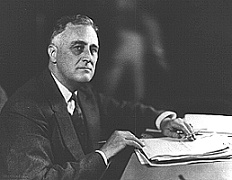
On this Christmas Eve there are over ten million men in the armed forces of the United States alone. One year ago 1,700,000 were serving overseas. Today, this figure has been more than doubled to 3,800,000 on duty overseas. By next July first that number overseas will rise to over 5,000,000 men and women. That this is truly a World War was demonstrated to me. [For the full text, Click here.]
Church and Reich: Bishop Frings, in his Christmas sermon, again emphasizes that it is wrong to kill innocents just because they belong to another race, but again he fails to mention the word "Jew" or "non-Aryan." (THP)
1944 World War II: Various: Ardennes: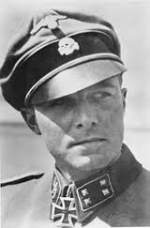
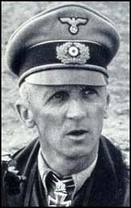
Ardennes: Leading elements of Manteuffel's army is still four miles short of the Meuse River at Dinant. It is to be the high-water mark of the German advance.
Ardennes: The Allies begin a strong counteroffensive. The US 4th Armored Division, part of Patton's Third Army, from around Mortelange is designated to relieve Bastogne.
President Franklin D. Roosevelt: Radio Message to the Fighting Men of the Merchant Marine:
The steel walls of Hitler's and Hirohito's brutal empires will draw tight about their throats. Our plans are made and we are united. Hitler is listening and he would like to know when we are launch the attack that will seal his doom. So I cannot tell you but those plans are set and they will be carried out. A truly great American will lead that attack our own General Eisenhowser [sic] and back of him in a powerful united effort are the full resources of all our nations combined to render a crushing defeat to those who gained what they have through force. We will defeat them.
Greece: Churchill and Anthony Eden arrive in Athens to arrange for the settlement of the Greek Civil War. 1977 Death: Charlie Chaplin:
Born Charles Spencer Chaplin in London, England, on April 16, 1889, Charlie Chaplin's rise to fame is a true rags-to-riches story. His father, a notorious drinker, abandoned Chaplin, his mother and his older half-brother, Sydney, not long after Chaplin's birth. That left Chaplin and his brother in the hands of their mother, a vaudevillian and music hall singer who went by the stage name Lily Harley.
Chaplin's mother, who would later suffer severe mental issues and have to be committed to an asylum, was able to support her family for a few years. But in a performance that would introduce her youngest boy to the spotlight, Hannah inexplicably lost her voice in the middle of a show, prompting the production manager to push the five-year-old Chaplin, whom he'd heard sing, onto the stage to replace her. . . .
In 1914 Chaplin made his film debut in a somewhat forgettable one-reeler called Make a Living. To differentiate himself from the clad of other actors in Sennett films, Chaplin decided to play a single identifiable character, and "The Little Tramp" was born, with audiences getting their first taste of him in Kid Auto Races at Venice (1914). . . .
Chaplin kept creating interesting and engaging films in the 1930s. In 1931, he released City Lights, a critical and commercial success that incorporated music Chaplin scored himself.
More acclaim came with Modern Times (1936), a biting commentary about the state of the world's economic and political infrastructures. The film, which did incorporate sound, was, in part, the result of an 18-month world tour Chaplin had taken between 1931 and 1932, a trip during which he'd witnessed severe economic angst and a sharp rise in nationalism in Europe and elsewhere.
Chaplin spoke even louder in The Great Dictator (1940), which pointedly ridiculed the governments of Hitler and Mussolini. "I want to see the return of decency and kindness," Chaplin said around the time of the film's release. "I'm just a human being who wants to see this country a real democracy. . . ."
But Chaplin was not universally embraced. His romantic liaisons led to his rebuke by some women's groups, which in turn led to him being barred from entering some U.S. states. As the Cold War age settled into existence, Chaplin didn't withhold his fire from injustices he saw taking place in the name of fighting Communism in his adopted country of the United States.
Chaplin soon became a target of the right-wing conservatives. Representative John E. Rankin of Mississippi pushed for his deportation. In 1952, the Attorney General of the United States obliged when he announced that Chaplin, who was sailing to Britain on vacation, would not permitted to return to the United States unless he could prove "moral worth." The incensed Chaplin said good-bye to United States and took up residence on a small farm in Corsier-sur-Vevey, Switzerland.
Nearing the end of his life, Chaplin did make one last visit to the United States in 1972, when he was given an honorary Academy Award. The trip came just five years after Chaplin's final film, A Countess from Hong Kong (1967), the filmmaker's first and only color movie. Despite a cast that included Sophia Loren and Marlon Brando, the film did poorly at the box office. In 1975, Chaplin received further recognition when he was knighted by Queen Elizabeth.
In the early morning hours of December 25, 1977, Charlie Chaplin died at his home in Corsier-sur-Vevey, Vaud, Switzerland. [For further information, click here.]
1991 Gorbachev resigns as president of the USSR: Mikhail Gorbachev announces that he is resigning as president of the Soviet Union. In truth, there was not much of a Soviet Union from which to resign—just four days earlier, 11 of the former Soviet republics had established the Commonwealth of Independent States (CIS), effectively dismembering the USSR. The Soviet Union, for all intents and purposes, had already ceased to exist. [For further information, click here]
Edited by Levi Bookin (Copy editor) Click to join 3rdReichStudies
FAIR USE NOTICE: This site may contain copyrighted material the use of which has not always been specifically authorized by the copyright owner. We are making such material available in our efforts to advance understanding of historical, political, human rights, economic, democracy, scientific, environmental, and social justice issues, etc. We believe this constitutes a 'fair use' of any such copyrighted material as provided for in section 107 of the US Copyright Law. In accordance with Title 17 U.S.C. Section 107, the material on this site is distributed without profit to those who have expressed a prior interest in receiving the included information for research and educational purposes. If you wish to use copyrighted material from this site for purposes of your own that go beyond 'fair use', you must obtain permission from the copyright owner.
Please note that the list-owner and the moderator are not responsible for, and do not necessarily approve of, the random ads placed on our pages by our web server. They are, unfortunately, the price one pays for a 'free' website.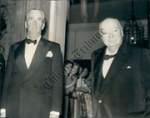

levi.bookin@gmail.com






